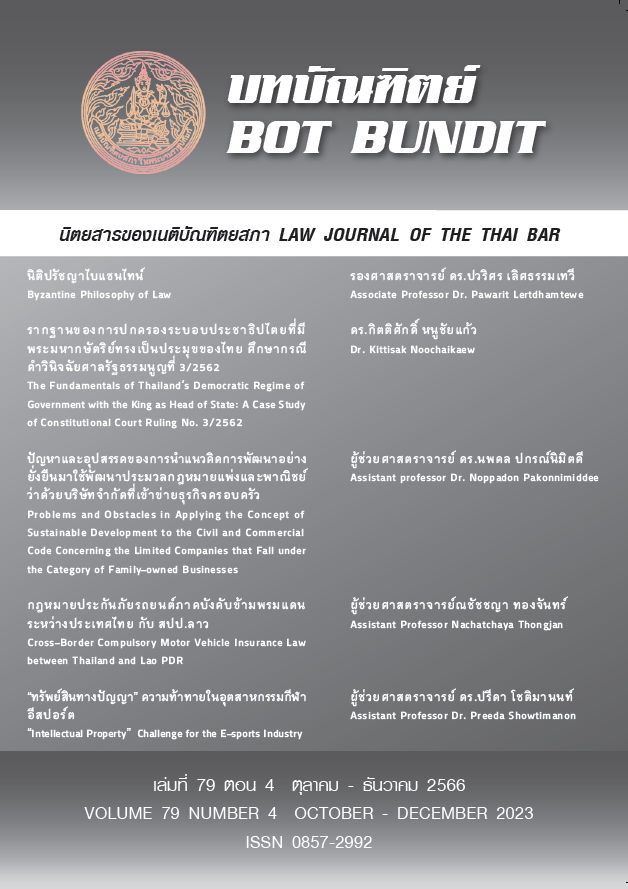นิติปรัชญาไบแซนไทน์
Main Article Content
บทคัดย่อ
นิติปรัชญาโรมันมีวิวัฒนาการมาตั้งแต่ยุคโบราณสมัยกำเนิดราชอาณาจักรโรมัน (753 ปีก่อนคริสต์กาล) จนถึงจักรวรรดิโรมันตะวันออกหรือไบแซนไทน์ล่มสลาย (ค.ศ. 1453) บทความนี้กล่าวถึงนิติปรัชญาโรมันในยุคไบแซนไทน์ ซึ่งอาจกล่าวได้ว่าไม่มีนิติปรัชญาไบแซนไทน์หรืออย่างน้อยไม่มีปรัชญายุคไบแซนไทน์อย่างที่เราเข้าใจในปัจจุบันเนื่องจากการล่มสลายของไบแซนไทน์ทำให้เอกสารงานเขียนของนักปรัชญาหลายฉบับได้ถูกทำลายและสูญหายไปจากประวัติศาสตร์ วัตถุประสงค์ของบทความนี้คือการวิเคราะห์แนวคิดของนักคิดคนสำคัญในยุคไบแซนไทน์ซึ่งสืบทอดแนวคิดมาจากปรัชญาโรมัน อาทิ นกับุญจอห์นแห่งดามาสกัส นกับุญโฟเทียสแห่งคอนสแตนติโนเปิล และไมเคิล เฟลลอส นิติปรัชญาไบแซนไทน์ชี้ให้เห็นว่าความมั่นคงของรัฐเกิดขึ้นจากสองปัจจัย ได้แก่อาวุธและกฎหมาย ฉะนั้น จักรพรรดิจัสติเนียนในคริสต์ศักราชที่ 6 ได้ทำการรวบรวมเอกสารหลักกฎหมายโรมันภายใต้คลังกฎหมายแพ่งหรือประมวลกฎหมายของพระเจ้าจัสติเนียน
Article Details

อนุญาตภายใต้เงื่อนไข Creative Commons Attribution-NonCommercial-NoDerivatives 4.0 International License.
เอกสารอ้างอิง
ภาษาไทย
จรัญ โฆษณานันท์, นิติปรัชญา (สำนักพิมพ์มหาวิทยาลัยรามคำแหง 2561).
ปวริศร เลิศธรรมเทวี, ‘นิติปรัชญาโรมัน’ (2565) 1 บทบัณฑิตย์ 26.
ปวริศร เลิศธรรมเทวี, ‘นิติปรัชญาในโลกมุสลิม’ (2565) 2 วารสารนิติศาสตร์ มหาวิทยาลัยธรรมศาสตร์ 292.
มุนินทร์ พงศาปาน, ระบบกฎหมายซีวิลลอว์: จากกฎหมายสิบสองโต๊ะสู่ประมวลกฎหมายแพ่งและพาณิชย์ (สำนักพิมพ์วิญญูชน 2562).
วรเจตน์ ภาคีรัตน์, ประวัติศาสตร์ความคิดนิติปรัชญา (สำนักพิมพ์อ่าน 2561).
ภาษาต่างประเทศ
Andrew Louth, St. John of Damascene: Tradition and Originality in Byzantine Theology (Oxford University Press 2009).
Angeliki B. Laiou, ‘Law, Justice, and the Byzantine Historians: Ninth to Eleventh Centuries’ in Angeliki Laiou and Dieter Simon (eds) Law and Society in Byzantium: Ninth-Twelfth Centuries (Harvard University Press 1994).
Anthony Kaldellis, The Argument of Psellos’ Chronographia (Brill 1999).
Aristotle, De Interpretatione (On Interpretation) (no publisher 322 BC).
—— De Generatione Animalium (On the Generation of Animals) (no publisher 384–322 BC).
Averill Cameron, Byzantine Matters (Princeton University Press 2014).
Cyril A. Mango, Byzantium: The Empire of New Rome (Charles Scribner’s Sons 1980).
Dan Jones, Powers and Thrones: A New History of the Middle Ages (Head of Zeus 2021).
David Bates, William The Conqueror (Yale University Press 2016).
Fernanda Pirie, The Rule of Laws: A 4,000-Year Quest to Order the World(Profile Books 2021).
Hermann S. Schibli, Hierocles of Alexandria (Oxford University Press 2002).
Ivan Christov, ‘Neoplatonic Elements in the Writings of Patriarch Photius’ in Mikonja Knezvic (ed) The Way of Byzantine Philosophy (Sebastian Press 2015).
John of Damascus, Pege Gnoseos (Fountain of Knowledge) (no publisher 749).
John Duffy, ‘Hellenic Philosophy in Byzantium and the Lonely Mission of Michael Psellos’ in Katerina Ierodiakonou (ed) Byzantine Philosophy and Its Ancient Sources (Oxford University Press 2002).
John Haldon, ‘The Feudalism Debate Once More: The Case of Byzantium’ (1989) 17 Journal of Peasant Studies 4.
—— Byzantium: The Surprising Life of A Medieval Empire (Penguin Books 2007).
Judith Herrin, Ravenna: Capital of Empire, Crucible of Europe (Penguin Books 2020).
Kevin Lygo, The Emperors of Byzantinum (Thames & Hudson Ltd. 2022).
Leslie Brubaker, Inventing Byzantine Iconoclasm (Bristol Classical Press 2012).
Leslie Brubaker and John F. Haldon, Byzantine in the Iconoclasm Era c.680 – 850: A History (Cambridge University Press 2011).
Marc Morris, The Anglo-Saxons: A History of the Beginnings of England (Hutchinson 2021).
Michale J. Jeffreys, ‘Michael Psellos and the Monastery’ in Michael J. Jeffreys and Marc D. Lauxtermann (eds) The Letters of Psellos: Cultural Networks and Historical Realities (Oxford University Press 2017).
Michael Psellos, Commentary on the Chaldean Oracles (unpublished).
—— De omnifaria doctrina (unpublished).
—— Encomium to his Mother (no publisher 1078) Section 30c.
—— Chronographia (E.R.A. Sewter tr, Fourteen Byzantine Rulers: The Chronographia of Michael Psellus, Penguin Books 1966).
Millard J. Erickson, Introducing Christian Doctrine (Baker Book House 1992).
Paul Magdalino, ‘Justice and Finance in the Byzantine State: Ninth to Twelfth Centuries’ in Angeliki Laiou and Dieter Simon (eds) Law and Society in Byzantium: Ninth-Twelfth Centuries (Harvard University Press 1994).
Paul Moore, Iter Psellianum: A Detailed Listing of Manuscript Sources for All Works Attributed to Michael Psellos (Pontifical Institute of Medieval Studies 2005).
Peter Adamson, Byzantine and Renaissance Philosophy (Oxford University Press 2022).
Peter Sarris, Byzantium: A Very Short Introduction (Oxford University Press 2015).
Photius, Bibliotheca (no publisher 893).
Procopius, The Secret History (G.A. Williamson and Peter Sarris trs, Penguin Books 2007).
Simon Corcoran, The Empire of the Tetrarchs, Imperial Pronouncements and Government AD 284–32 (Clarendon Press 2000).
Thomas Aquinas, Summa Theologiae (no publisher 1271).
Thomas M. Banchich, John Marenbon and Charles J. Reid, Jr., ‘The Revival of Roman Law and Canon Law’ in Fred D. Miller, Jr. and Carrie-Ann Biondi (eds) A History of the Philosophy of Law from the Ancient Greeks to the Scholastics(Springer 2015).
Thomas Patrick Hughes, A Dictionary of Islam (KAZI Publications, Inc. 2007).
Timothy D. Barnes, Constantine and Eusebius (Harvard University Press 1981).
Vassa Kontouma, John of Damascus: New Studies on his Life and Works (Routledge 2015).
Vivien Prigent, ‘The Mobilisation of Fiscal Resources in the Byzantine Empire (Eight to Eleventh Centuries)’ in John Hudson and Ana Rodriguez (eds) Diverging Path? The Shapes of Power and Institutions in Medieval Christendom and Islam (Brill 2014).
Warren T. Treadgold, The Nature of the Bibliotheca of Photius (Dumbarton Oaks 1980).
—— A History of the Byzantine State and Society (Stanford University Press, 1997).
William Lewis Leadbetter, Galerius and the Will of Diocletian (Routledge 2009).


